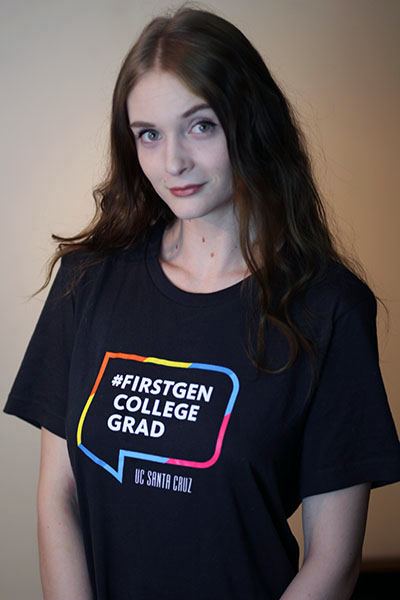Allysha Leonard

Name: Allysha A. Leonard
Department: Anthropology
What Award/ Scholarship did you receive? I received a Dean’s Undergraduate Award.
What year do you expect to graduate? I completed my credits for graduation in Winter quarter of 2020.
Where do you call home? I just moved to San Francisco, but I grew up in Santa Cruz and completed my education at the University.
With all of the choices for college, what made UC Santa Cruz stand out? UCSC stood out to me because it is the University renowned in my hometown, and shows high success rates for those seeking higher education and deeper research in their interests. I am especially moved by the ideas of social justice and sustainability that are recurring themes at UCSC and hold importance in evaluating the field of archaeology today.
What is your field of focus? Archaeology/Anthropology
What do you hope to do once you graduate from UC Santa Cruz? Work in curation of archaeological artifacts and see to their successful processing in all archaeological projects. Look into museum exhibition and possibly becoming a founder of a repository for artifacts.
What is one memorable moment that stands out for you as a student here? One memorable moment that stands out to me as a student at UCSC was the ability to enroll in independent study courses and partake in multiple archaeological internships, which would later provide data and research to my thesis. The anthropology department and faculty are very supportive of their students and will see to the fulfillment of a well-rounded education, enthused for greatness and not mediocrity. The fact that there were no “shortcuts” proved to me that the school takes their student’s very seriously, while many students on campus seem to have lost their enthusiasm for higher education and float through their classes. By creating this sort of environment, UCSC stood out to me as a college that supports the greater goals, not just handing out degrees.
What is your one piece of advice for incoming students about life at UC Santa Cruz? I would advise to please not worry about other people and how much easier it may be for them, and instead worry about yourself. There are so many kinds of students at UCSC with different backgrounds and support systems, and to compare your struggles to theirs will only be disheartening. Not everyone is aware of what each other is going through to be there, that day, in that exact class, and responding to that situation with an open mind that is focused on your achievements is the best. Use what you have to power you through you goals, and don’t let anyone, including yourself, bring you down.
How will this scholarship impact your academic life /research? I will be able to prove my thesis and project regarding how reassembling and reevaluating archaeological archives holds great significance to the field of archaeology today and its participants/consumers. Having this award further validates my own work and what I have to say, and I may look into further publishing of my project.
Comments from Allysha Leonard's faculty mentor:
Allysha Leonard received both a Deans' Award and a Chancellor's Award for her research A California Case Study on Procedures to Reassemble and Reevaluate Archaeological Artifact Processing. In the letter of support for her work, her faculty mentor wrote “in her senior thesis, Allysha Leonard investigates several issues contributing to the current “curation crisis” in archaeology. In addition to tackling the underlying issue of a general shortage of adequate storage for growing archaeological collections in museums and other curation facilities in the U.S., Allysha investigates such issues as data entry and the loss of data, archival backlogs, and other negative effects associated with processing and archiving materials. With specific focus on the curation crisis in California, Allysha employs an unusual analytical framework to better understand these persistent problems: “Lean Manufacturing” and “Kaizen Waste Improvement” (process improvement strategies involving waste reduction) from the world of business/manufacturing. Terminology and concepts associated with an analytical approach informed by practices situated outside of the field of anthropology (terms like “waste” and “defect”) might at first seem incongruous with the study, interpretation, and preservation of material culture. Yet, given the long-standing and on-going problems of inadequate storage and minimal care for archaeological materials (data, ironically, deemed “valuable” by most archaeologists and museum scientists), Allysha’s thesis is provocative while also offering a fresh perspective on curation and conservation policies in dire need of help. The thesis is well-written, thoughtfully organized, and, at 120 pages, is substantially more than we expect from undergraduates meeting their capstone exit requirements for the anthropology major. Moreover, the thesis includes several figures designed by Allysha that help reinforce important concepts and reflect her motivation to creatively convey information to both scholarly and non-academic audiences, another important intervention and treatment in the on-going curation crisis. In sum, Allysha Leonard is a serious and accomplished young scholar who possesses the creativity and motivation to accomplish (and revitalize) sorely needed collections-based archaeological research, who is eager to contribute to and improve the field of archaeology.”
